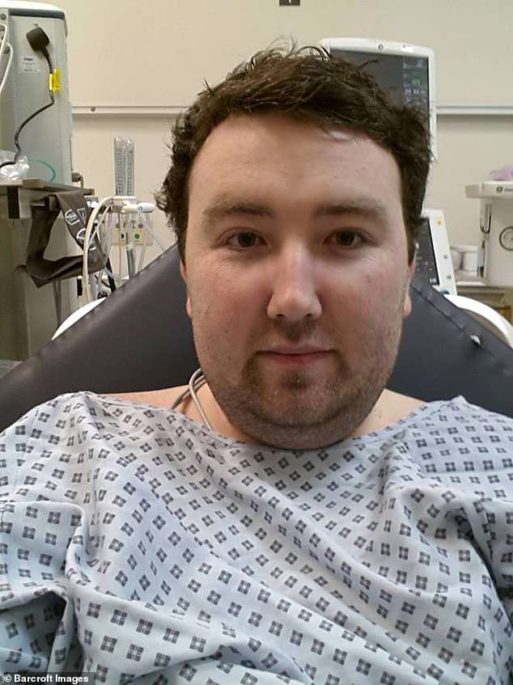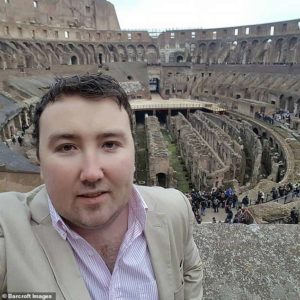A 29-year-old Australian man living in London has died nine times.

Jamie Poole
Credit: dailymail.co.uk
Well, to be more truthful, he’s endured nine cardiac arrests in which his heart suddenly stops beating.
Jamie Poole has dealt with these sudden heart stops on a relatively regular basis since he turned 20. He suffers from hypertrophic cardiomyopathy. He’s been able to come back from these episodes successfully so far, but doctors have warned that his heart may only last another five years.
Hypertrophic cardiomyopathy is a condition that causes the heart muscle to become abnormally thick. This thickening makes it harder for the heart to pump blood out of the heart and around the body, which can be fatal. It may also cause a cardiac arrhythmia, a malfunction of the heart’s electrical system which can lead to sudden cardiac arrest. The disease is thought to afflict roughly one in 5,000 people. Many patients who have the condition don’t suffer serious consequences. Jamie’s version, unfortunately, is a bit more serious than others and could certainly lead to his death.
Poole’s condition also explains why he experiences cardiac arrests and not heart attacks. Cardiac arrests occur when a cardiac arrhythmia causes the heart to stop beating or beat so erratically that blood flow from the heart virtually stops. A heart attack happens when a blockage restricts blood flow to a portion of the heart, cutting off its supply of oxygen and damaging the muscle. A heart attack may lead to arrhythmia and cardiac arrest, but an arrythmia can’t cause a heart attack.
Doctors have inserted a device known as an implantable cardioverter-defibrillator, or ICD, into Poole’s chest. The device jump starts his heart automatically during a cardiac arrest.
According to Jamie, his nine cardiac arrest episodes have caused him to have every near-death experience possible. He’s had out-of-body experiences, and seen both “white” and “golden” lights. He refers to the “eight seconds of dying” in which he knows his heart is about to stop beating; but can’t do anything about it.
Though he can sense when an impending cardiac arrest will happen, the causes seem to be random.
“The first time I had a cardiac arrest was when I was 20,” said Poole, who works as a creative technologist. “They took 45 minutes of CPR to get me up. I woke up a week later from a coma and was told everything that happened…The second time I was at my cousin’s. I felt dizzy and went into cardiac arrest. I remember waking up thinking, ‘Did I really go to my cousins or was it all a dream?’”
Cardiac arrests three, four, five and six all occurred within a three-week period after his move to London. All four happened while he was either walking to work or during his work day. The seventh cardiac arrest happened in his office; the eighth at an airport in Australia, and the most recent while he was in the hospital undergoing a heart transplant assessment.
“Unfortunately, they turned off my ICD as they had me on the treadmill to do a transplant assessment,” Poole said. “I actually remember seeing the physiologist slam the emergency stop button on the treadmill…He yelled out, ‘I need some help in here,’ and then I collapsed and passed out at that point. I woke up to the physiologist performing CPR on my chest.”
As mentioned earlier, doctors have informed Jamie that his heart may only last another five years. So a heart transplant may be the only way for him to live a longer, more fulfilling life.
“Who knows,” Jamie said, “I might have my custom heart built out of stem cells one day. As long as I live that long to see those kind of improvements, then I am happy.”
Living A Full Life Despite His Condition
Jamie admits that, despite living with hypertrophic cardiomyopathy, he tries to live life to the fullest. Though his doctor has actually suggested he stay away from exercise, he still travels, and takes part in activities that could aggravate his condition.

Credit: dailymail.co.uk
For instance, he went snowboarding down the French Alps, not worrying about the fact that it could cause a cardiac arrest.
“I think I’m risking a little bit more just for those moments of experience,” he said. “I think there is some level of risk I like to take to make sure that I am still experiencing an interesting, full life.”
He’s an avid traveler, and thinks that people should take the time to appreciate little moments in life and to value experiences over material items.
“The advice that I would give to somebody after I’ve had my experiences,” Poole said, “is definitely just enjoy the little things in life, don’t take them for granted and cherish those moments. I think my other advice would be that memories are more valuable than things. Go and experience the world.”
Those are words we can all appreciate and strive to live by.

 Man With Hypertrophic Cardiomyopathy Has “Died” Nine Times
Man With Hypertrophic Cardiomyopathy Has “Died” Nine Times


 “Making Mobiles” by Karolina Merska
“Making Mobiles” by Karolina Merska
 “Hands Up to the Sky” by Michael Franti & Spearhead
“Hands Up to the Sky” by Michael Franti & Spearhead















